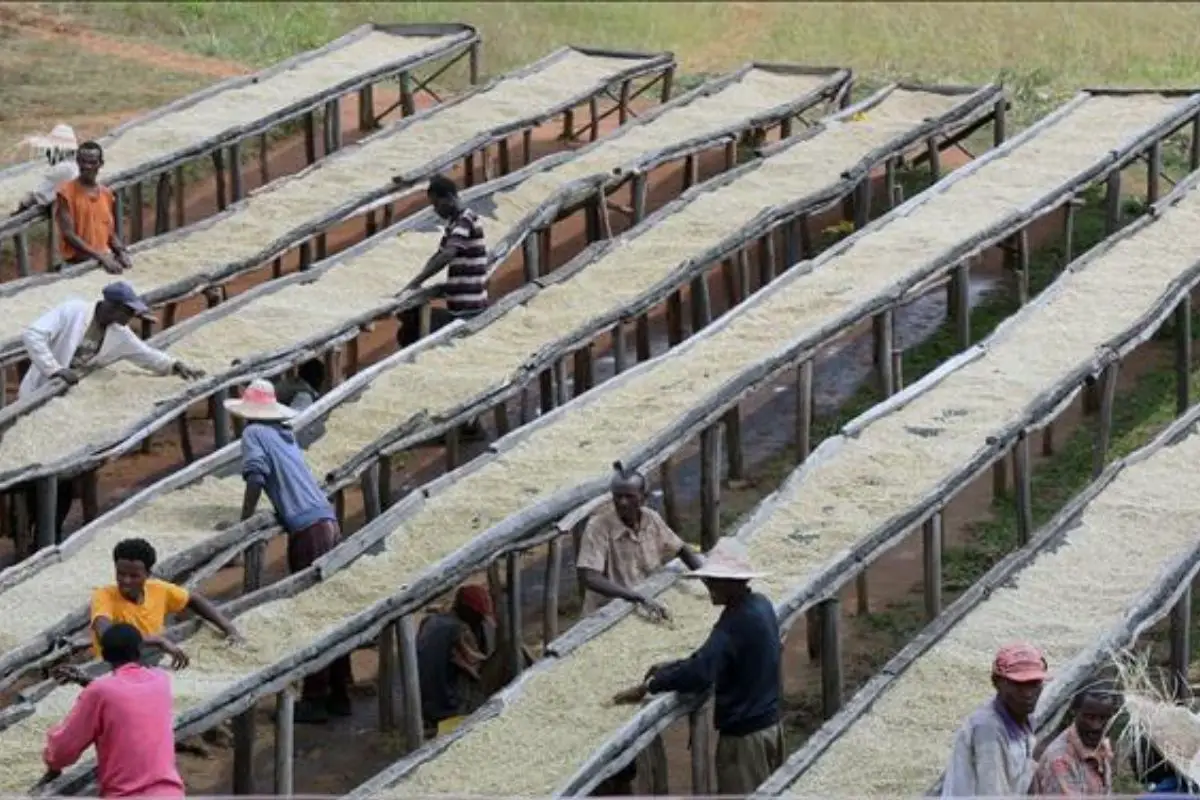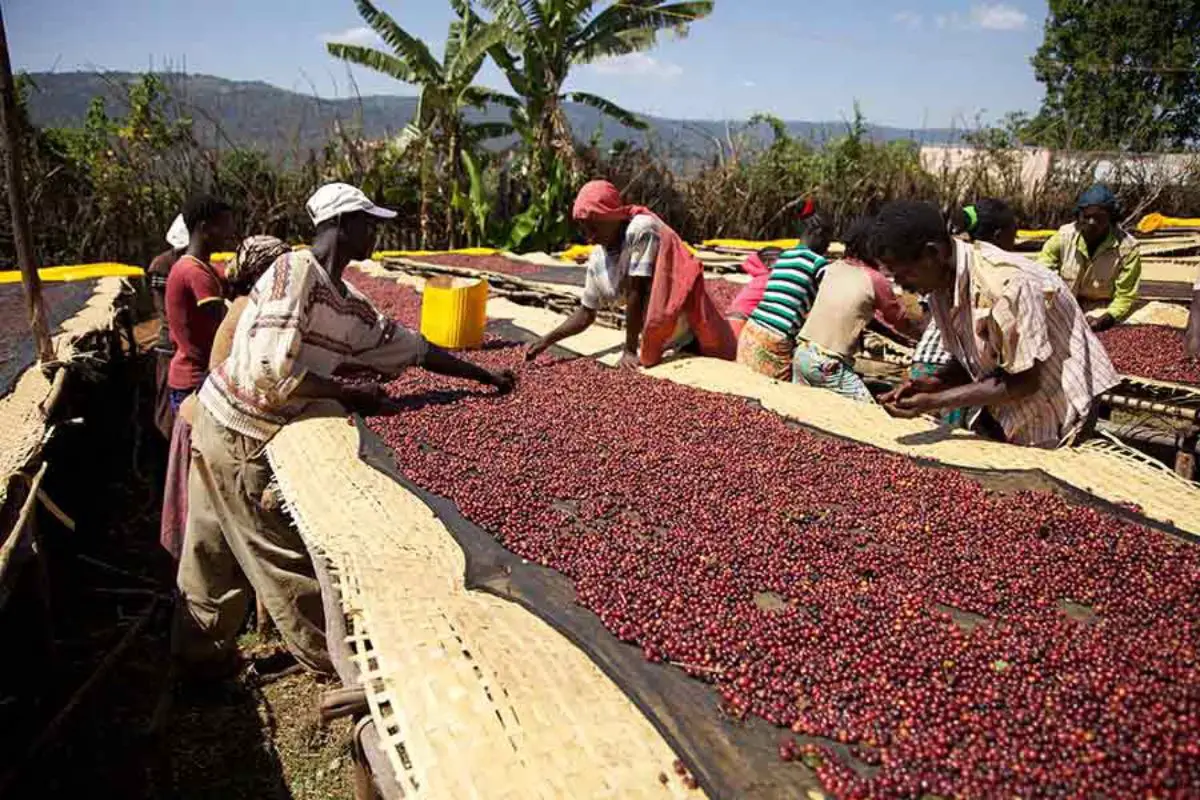In this article, readers will learn about the importance of coffee in Ethiopia’s economy, its history, and its geographical distribution. The article explores the direct and indirect employment opportunities in the coffee industry, including coffee production, processing, transport, and marketing. It discusses the challenges and limitations in coffee-driven job creation, such as global price fluctuations and climate change. Furthermore, the article delves into the opportunities and strategies for enhancing job creation in the coffee sector, including promoting specialty coffee, supporting smallholder cooperatives, and investing in education and skill development.

Overview of the Coffee Industry in Ethiopia
History of Coffee in Ethiopia
Ethiopia is often considered the birthplace of coffee, with its history dating back to the 9th century. It is said that a young goat herder named Kaldi discovered the coffee plant when he noticed his goats becoming more energetic after eating the berries from the plant. The word then spread about the stimulating effect of the berries, and coffee cultivation and consumption began in Ethiopia. Today, Ethiopian coffee is renowned for its unique and diverse flavors, admired by coffee connoisseurs all over the world.
Geographical Distribution of Coffee Production
Coffee production in Ethiopia is spread over several regions, primarily in the highland areas with an altitude between 1,000 and 2,000 meters. The diverse agro-ecological conditions and the presence of various microclimates give rise to several unique coffee flavors, making Ethiopian coffee highly sought-after.
Major Coffee Producing Regions
There are four major coffee-producing regions in Ethiopia, namely Sidama, Yirgacheffe, Harrar, and Jimma. Each region is known for producing distinct coffee profiles. For instance, Sidama and Yirgacheffe coffee beans are prized for their floral, citrus, and sometimes berry-like flavors. Harrar coffee, on the other hand, is known for its fruity, wine-like characteristics, while Jimma coffee exhibits a richer, more balanced flavor profile.
Coffee Production Process and Varieties
Ethiopia is home to thousands of coffee varieties, many of which are indigenous to the country. The coffee production process in Ethiopia usually follows two methods: the wet-processing method, where the coffee cherries are depulped, fermented, and washed before being dried, and the dry-processing method, where the cherries are dried directly under the sun. Wet-processed coffees tend to have a bright, clean acidity, while dry-processed coffees retain more fruity and complex flavors.
Economic Importance of Coffee in Ethiopia
Coffee Exports and Foreign Exchange
Coffee is Ethiopia’s main export commodity and a vital source of foreign exchange. It accounts for about 30% of the country’s annual export earnings, generating over $1 billion in revenue. Ethiopia’s coffee exports serve as a crucial factor for the country’s economic stability and growth.
Contribution to GDP
Coffee production contributes significantly to Ethiopia’s Gross Domestic Product (GDP). It represents approximately 3.2% of the country’s GDP and plays a crucial role in the livelihood of millions of Ethiopians. As a major cash crop, coffee provides sustenance and income for millions of households, helping alleviate poverty and drive economic growth.
Government Initiatives and Policies
The Ethiopian government has played an active role in promoting the coffee sector by implementing various initiatives and policies. They offer tax incentives, encourage quality improvement, and invest in infrastructure to support the coffee industry. They have also established organizations, such as the Ethiopian Coffee and Tea Authority, to regulate, support, and promote the coffee sector.
Direct Employment Opportunities in Coffee Production
Smallholder Farmers
Smallholder farmers make up the majority of coffee producers in Ethiopia, with an estimated 15 million people relying on coffee production for their livelihoods. These farmers typically cultivate coffee on small plots of land and often intercrop with other food crops, providing income and food security for their families.
Commercial Coffee Plantations
In addition to smallholder farmers, the Ethiopian coffee sector also includes large commercial estates and cooperatives. These coffee plantations employ thousands of people and contribute significantly to the country’s coffee production and export volume.
Coffee Processing Facilities and Mills
Coffee processing facilities and mills employ a significant number of workers in various roles, including machine operators, laborers, and administrative staff. They are responsible for wet or dry processing, sorting, and packing of coffee beans before they are exported or marketed domestically.
Indirect Employment Opportunities in the Coffee Industry
Transport and Logistics
The coffee industry provides job opportunities in the transport and logistics sector, including truck drivers, warehouse staff, and logistics coordinators. These roles are essential in ensuring the timely and efficient movement of coffee beans from production sites to processing facilities, and eventually to export or local distribution points.
Quality Control and Assurance
Quality control and assurance personnel play a crucial role in maintaining the high quality of Ethiopian coffee. They are responsible for testing and grading the coffee beans, ensuring they meet the established quality standards. This process guarantees that Ethiopian coffee maintains its international reputation for exceptional quality.
Marketing and Sales
Marketing and sales professionals are responsible for promoting Ethiopian coffee both domestically and internationally. They work to create brand awareness, develop new markets, and increase consumption, further driving demand and revenue for the coffee industry.
Research and Development
The coffee industry also provides job opportunities in research and development, with scientists and researchers working on various projects related to coffee production, processing, and sustainability. These roles help to improve the quality, efficiency, and environmental impact of the industry, ensuring the long-term success and growth of Ethiopian coffee.
Coffee-Related Businesses and Job Creation
Local Coffee Roasters and Distributors
The growth of the coffee industry in Ethiopia has led to the emergence of numerous local coffee roasters and distributors. These businesses provide employment to Ethiopians involved in roasting, packaging, distribution, and administration.
Coffee Shops and Cafés
The popularity of coffee culture in Ethiopia has led to a growing number of coffee shops and cafés in the country. These establishments create job opportunities for baristas, servers, managers, and other staff, providing employment and additional income for many Ethiopians.
Tourism and Agritourism
Ethiopia’s rich coffee heritage and beautiful coffee landscapes attract tourists from around the world, creating opportunities for employment in the tourism sector. In recent years, agritourism, which allows visitors to experience Ethiopia’s coffee culture firsthand, has gained popularity.
Coffee Farm Tours
Coffee farm tours provide employment for tour guides, drivers, and support staff while offering visitors an immersive experience in the coffee production process and a chance to observe the beautiful landscapes and local communities where coffee is grown.
Cultural Experiences and Educational Programs
Cultural experiences and educational programs related to coffee, such as coffee ceremonies and barista training courses, provide additional employment opportunities for local communities. These activities help increase awareness of Ethiopia’s unique coffee heritage and generate income for those involved.
Challenges and Limitations in Coffee-Driven Job Creation
Global Coffee Price Fluctuations
The volatility of global coffee prices can have a significant impact on Ethiopia’s coffee industry and job creation. Declining prices may force farmers and producers to cut costs, potentially resulting in job losses or reduced wages in the sector.
Climate Change and its Effects on Coffee Production
Climate change poses a significant threat to coffee production in Ethiopia. Changes in temperature and precipitation patterns may reduce the coffee-growing area or affect the quality of coffee beans, impacting the livelihoods of countless farmers and workers in the industry.
Unemployment Outside the Coffee Harvest Season
Most job opportunities in coffee production are seasonal, concentrated during the harvest season, which lasts from October to January. Many coffee workers may struggle to find employment outside this period, faced with unemployment or underemployment during the off-season.
Labor Rights and Working Conditions
Labor rights and working conditions in the coffee industry, particularly for smallholder farmers and seasonal workers, remain a concern. Many workers receive low wages and lack access to essential social protection, such as health insurance and pension schemes.
Opportunities and Strategies for Enhancing Job Creation in the Coffee Industry
Promoting Specialty Coffee and Added-Value Products
Investing in the production and promotion of specialty coffees and added-value products, like ready-to-drink coffee beverages, can increase demand and create new job opportunities in various segments of the industry.
Supporting Smallholder Cooperatives and Social Enterprises
Providing support to smallholder cooperatives and social enterprises can help improve farmers’ access to education, resources, and markets, empowering them to increase production, enhance quality, and secure better prices for their coffee, ultimately resulting in job creation and higher incomes.
Investing in Education and Skill Development
Investing in education and skill development for those involved in the coffee production process can help foster innovation, improve productivity, and create new opportunities in research, marketing, and other areas of the industry.
Exploring International Fair Trade and Sustainable Sourcing Opportunities
Participating in international fair trade and sustainable sourcing programs can help ensure fair and stable prices for Ethiopian coffee producers while promoting ethical supply chains, creating an environment in which the coffee industry can thrive and continue to create jobs.
FAQs on The Impact of Coffee on Job Creation in Ethiopia
How significant is coffee production for job creation in Ethiopia?

Coffee production in Ethiopia generates employment for approximately 15 million people, contributing to nearly 25% of the country’s population (ICO, 2020). The sector plays a crucial role in income generation and overall economic development.
What percentage of Ethiopia’s agriculturally-based workforce is involved in coffee production?
In Ethiopia, around 60% of the population works in agriculture (World Bank, 2021). Coffee production accounts for approximately 16% of the agriculturally-based labor force, signifying its importance in creating livelihood opportunities.
How does coffee production contribute to various economic sectors in Ethiopia?
Besides direct cultivation, coffee production fuels various economic sectors in Ethiopia, including transportation, processing, and retail. The trade also generates income through coffee-related tourism, promoting small scale businesses (Stell, 2017).
How does Ethiopian coffee benefit from international trade?
Ethiopian coffee benefits from international trade in several ways. As of 2018, Ethiopia’s coffee exports were valued at 1.4 billion USD (OEC, 2021). In addition, the relations fostered through trade lead to investments, job creation, and knowledge exchange.
What measures do the Ethiopian government or agencies take to promote sustainable coffee production and job security?
The Ethiopian government is actively promoting sustainable coffee production through initiatives like Ethiopian Coffee Development, focusing on increasing productivity, quality, and access to agricultural extension services (Bloomberg, 2019). The Global Coffee Platform and local partners also support sustainable practices and job security.
How do cooperatives and unions benefit coffee farmers and job creation in Ethiopia?
Cooperatives and unions in Ethiopia play a significant role in enhancing bargaining power, increasing incomes for farmers, and supporting community development (Tadesse, Alamirew & Emmert, 2021). They also improve governance and resource allocation, contributing positively to coffee production and job creation.